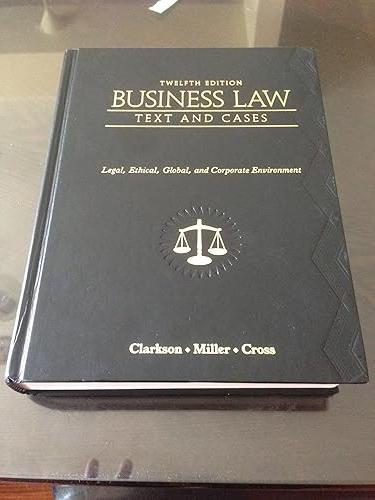Testator Marion E. Peterson died in 2008. She was survived by her two siblings [brother and sister],
Question:
Testator Marion E. Peterson died in 2008. She was survived by her two siblings [brother and sister], Arvin Peterson and Carolyn Peterson Basner (caveatorsb ). After testator’s death, Vasta Lucas, testator’s longtime companion and executor of testator’s estate, fi led a petition to probate testator’s will in solemn form. Lucas died during the pendency [pending period] of this appeal, and appellee Richard Harrell was appointed as successor executor and trustee for the estate. Caveators fi led a caveat to the petition to probate, alleging the will was not properly executed or had been revoked due to obliterations. The trial court admitted the will to probate and caveators appealed.
OCGA [the Offi cial Code of Georgia Annotated] Section 53-4-20(b) of the Revised Probate Code of 1998 provides that “a will shall be attested and subscribed in the presence of the testator by two or more competent witnesses.” The record evidence in this case establishes that testator executed a will on June 9, 1976. The will was witnessed by two subscribing witnesses, only one of whom was living at the time of trial. Having been provided a copy of testator’s will, the surviving witness testifi ed to its due execution by deposition testimony presented at trial and via written interrogatories fi led with the court. Caveators presented no evidence challenging either the validity of the signatures on the will or testator’s capacity at the time the will was executed.
Accordingly, the evidence supports the trial court’s fi nding that the will was duly executed.
The will contained a bequest to Lucas in the form of a trust and provided that upon Lucas’s death the trustee shall distribute any remaining assets to four benefi ciaries, including caveators. Some time after the will was executed, testator struck through with an ink pen the names of all successor benefi ciaries of the trust estate, as well as language in the will nominating Richard Harrell as successor executor and trustee.
None of the strike-throughs were witnessed or attested to. Near the end of the will, testator wrote,
“My executrix is Julie Peterson.”
Caveators contend these alterations constitute material cancellations that effect a revocation of the will.
To effect a revocation of a will by obliteration [elimination], caveators must show that testator made material obliterations to her will or directed another to do so and that testator intended for this act to revoke the will. Joint operation of act and intention is necessary to revoke a will. The intent to revoke the will in its entirety shall be presumed from the obliteration or cancellation of a material portion of the will, but such presumption may be overcome by a preponderance of the evidence. [Emphasis added.]
Even assuming, arguendo [for the sake of argument], that the alterations to testator’s will constituted a material cancellation within the meaning of OCGA Section 53-4-44, we fi nd no error in the trial court’s conclusion that testator did not intend to revoke her entire will.
The record supports the trial court’s fi ndings that caveators had no knowledge of the circumstances surrounding what they allege to be the revocation of the will, that testator never discussed revoking her will with caveators, and that caveators were not present when testator made the alterations to the will.
Caveators presented no evidence of testator’s intent other than the alterations themselves, and they satisfi ed their initial burden only by proving that testator made alterations to the will.
The record also shows, however, that the will was found in good condition on testator’s desk among her personal papers. It bore the signatures of both testator and her subscribing witnesses and set out a primary bequest to Lucas which remained intact. Handwritten alterations crossing out the names of the successor benefi ciaries with a single line were initialed by testator and she added language to the will indicating her desire to substitute Julie Peterson as her executrix. As found by the trial court, this evidence clearly indicates testator’s intent to cancel only certain provisions of the will, not an intent to revoke the will in its entirety as required for revocation under OCGA Section 53-4-44.
* * * *
Judgment affirmed.
Questions:-
1. Why would the caveators argue that the entire will should be revoked? How would the will’s revocation benefit them?
2. What could the testator have done differently to clarify her intentions in her will?
Step by Step Answer:

Business Law Text And Cases Legal Ethical Global And Corporate Environment
ISBN: 9780538470827
12th Edition
Authors: Kenneth W. Clarkson, Roger LeRoy Miller, Frank B. Cross





